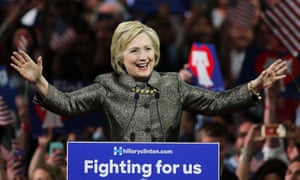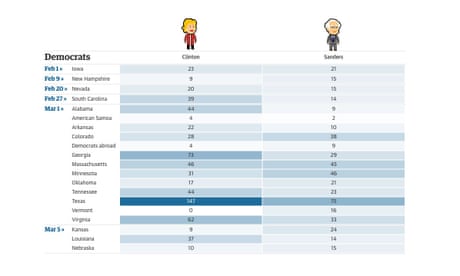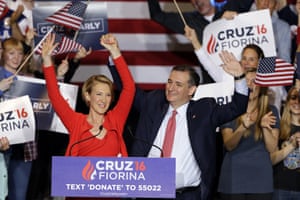As Clinton has all but locked up the Democratic presidential nomination, many are starting to wonder what the general election ticket might look like

FacebookTwitterPinterest Republican candidate Ted Cruz named Carly Fiorina as his running mate this week. Photograph: Michael Conroy/AP
Although Trump remains the clear frontrunner, having swept this week’s primaries on the east coast, it remains possible that thebombastic billionaire will not secure the 1,237 delegates required to clinch the Republican nomination. Party elites are gearing up for a contested convention in Cleveland in July, where efforts to thwart Trump may reach a fever pitch.
Advertisement
One senior Democrat who advises political campaigns said the assessment might differ if a candidate such as Marco Rubio, a bilingual Cuban American, were to resurface on the Republican side. The senator from Florida, who suspended his presidential campaign last month, has categorically ruled out any interest in the vice-presidency, and aides said they did not anticipate that to change.
Ohio governor John Kasich would also be a more formidable addition to a Republican ticket. But the last Republican establishment candidate standing has struggled in the delegate race and remains an unlikely savior to the party’s woes.
There is, of course, little precedence to indicate that vice-presidential picks are significantly consequential – with Sarah Palin, the former Alaska governor chosen by Republican nominee John McCain in 2008, ranking as perhaps the lone exception in recent history who clearly caused lasting damage to the credibility of a campaign.
Chris Murphy, a Connecticut Democrat backing Clinton, said while he was pleased to see his colleagues Kaine, Booker and Klobuchar named as potential contenders, the vetting process itself was little more than “an interesting parlor game”.
“I think a bad vice-presidential pick can sink your candidacy, but I’m not sure there are a lot of voters that make a choice to vote for a candidate based on their vice-president,” Murphy said.

Hillary Clinton in Philadelphia after winning the Pennsilvania state primary. Photograph: Eduardo Munoz Alvarez/AFP/Getty Images
Hillary Clinton emerged this week as all but certain to secure the Democratic party’s nomination for president after a drawn-out and at times contentious battle with Vermont senator Bernie Sanders.
And with just seven weeks remaining in the presidential primaries, Clinton’s campaign has begun to pivot toward the general election – a process that will include selecting a running mate ahead of the Democratic convention in Philadelphia this July.
Ted Cruz drew headlines for taking the unusual step of naming his vice-presidential pick, despite lacking a plausible path to his party’s nomination in an increasingly forlorn effort to stop Donald Trump.
As the Texas senator stood alongside Carly Fiorina, the former Hewlett-Packard CEO who dropped out of the Republican race in February, a new wave of speculation was launched about what the Democratic ticket might look like.

US election delegate tracker: who's winning the presidential nomination?
Read more
For Clinton, a diverse bench offers a wide array of possibilities – ranging from rising stars within the party to calculations rooted in demographics and the electoral map in November.
Allies have floated senators from key battleground states, such as Tim Kaine andMark Warner, both of swing state Virginia, and Sherrod Brown, a senator from Ohio who is also popular with the progressive wing of the party.
Some have suggested that an African American or Latino vice-presidential candidate would help energize core constituencies of the Democratic base who twice helped enthusiastically elect Barack Obama. That shortlist could include New Jersey senator Cory Booker and former Massachusetts governor Deval Patrick, both of whom are African American, as well as two Hispanic members of Obama’s administration: Julián Castro, the housing secretary; and Tom Perez, the US labor chief.
FacebookTwitterPinterest Cory Booker, Elizabeth Warren, and Tim Kaine are rumored options. Photograph: Reuters Photographer/Reuters
Clinton’s campaign chairman John Podesta said an all-female ticket would also be considered, a move that would potentially shatter two glass ceilings with one stone. The Democratic Senate includes several prominent women, including progressive icon Elizabeth Warren of Massachusetts and Amy Klobuchar of Minnesota.
But for all the possible political machinations, allies and supporters said Clinton would be a nominee with unparalleled experience: as a former first lady, two-term senator, and secretary of state. And with a Republican party currently being torn apart at the seams by frontrunner Trump, there would be ample opportunity to draw a symbolic contrast, regardless of a vice-presidential candidate’s gender, as well as their geographic or demographic background.
“This is going to be a contrast between strength, stability, and competence and an entertainment show,” said Missouri senator Claire McCaskill, a Clinton surrogate. “If you’re going up against something that is superficial and flashy, it’s really good to have a ticket that just oozes strength and stability.”
“My ideal ticket is Hillary Clinton and Tim Kaine,” she added in an endorsement of her Senate colleague from Virginia, pointing to his experience at both the federal and state level and his fluency in Spanish.
“He’s incredibly knowledgeable, a great communicator, has a firm grasp on the complexity of foreign policy, and he also understands in his bones the importance of social justice issues,” McCaskill said.
Paul Begala, a former adviser to Bill Clinton, also said he believed Clinton would first and foremost weigh who was best prepared to be one step removed from the nation’s highest office.
Although he is legally barred from coordinating with the campaign, as a consultant and adviser to Priorities of the pro-Clinton fundraising Super Pac Priorities USA Action, Begala said he was confident after watching Clinton closely for more than two decades that she would act on a similar model as Bill Clinton and Obama.
Advertisement
“She begins with a governing frame, not a campaign frame,” Begala said, adding that he recalled Clinton being impressed with Obama’s selection of Joe Biden.
“He has been a really terrific partner for the president, and that will matter to her a lot. Who can be a really good partner and help me govern?”
Begala also downplayed the conventional wisdom that a running mate must bring a certain balance to the ticket. Al Gore, for example, was a choice who, if anything, reinforced many of the characteristics embodied by Bill Clinton – a young southerner and face of the so-called New Democrats.
Begala, who ran Clinton’s 1992 campaign, said he had been leaning toward Senator Harris Wofford of Pennsylvania for more of a conventional political balance.
He then recounted asking Bill Clinton why he ultimately chose Gore. “Bill turned to me and said: ‘Because I might die, Pauly.’”
One key factor that sets apart this particular election is the uncertainty surrounding the opposing party.
Hillary Clinton emerged this week as all but certain to secure the Democratic party’s nomination for president after a drawn-out and at times contentious battle with Vermont senator Bernie Sanders.
And with just seven weeks remaining in the presidential primaries, Clinton’s campaign has begun to pivot toward the general election – a process that will include selecting a running mate ahead of the Democratic convention in Philadelphia this July.
Ted Cruz drew headlines for taking the unusual step of naming his vice-presidential pick, despite lacking a plausible path to his party’s nomination in an increasingly forlorn effort to stop Donald Trump.
As the Texas senator stood alongside Carly Fiorina, the former Hewlett-Packard CEO who dropped out of the Republican race in February, a new wave of speculation was launched about what the Democratic ticket might look like.

US election delegate tracker: who's winning the presidential nomination?
Read more
For Clinton, a diverse bench offers a wide array of possibilities – ranging from rising stars within the party to calculations rooted in demographics and the electoral map in November.
Allies have floated senators from key battleground states, such as Tim Kaine andMark Warner, both of swing state Virginia, and Sherrod Brown, a senator from Ohio who is also popular with the progressive wing of the party.
Some have suggested that an African American or Latino vice-presidential candidate would help energize core constituencies of the Democratic base who twice helped enthusiastically elect Barack Obama. That shortlist could include New Jersey senator Cory Booker and former Massachusetts governor Deval Patrick, both of whom are African American, as well as two Hispanic members of Obama’s administration: Julián Castro, the housing secretary; and Tom Perez, the US labor chief.
FacebookTwitterPinterest Cory Booker, Elizabeth Warren, and Tim Kaine are rumored options. Photograph: Reuters Photographer/Reuters
Clinton’s campaign chairman John Podesta said an all-female ticket would also be considered, a move that would potentially shatter two glass ceilings with one stone. The Democratic Senate includes several prominent women, including progressive icon Elizabeth Warren of Massachusetts and Amy Klobuchar of Minnesota.
But for all the possible political machinations, allies and supporters said Clinton would be a nominee with unparalleled experience: as a former first lady, two-term senator, and secretary of state. And with a Republican party currently being torn apart at the seams by frontrunner Trump, there would be ample opportunity to draw a symbolic contrast, regardless of a vice-presidential candidate’s gender, as well as their geographic or demographic background.
“This is going to be a contrast between strength, stability, and competence and an entertainment show,” said Missouri senator Claire McCaskill, a Clinton surrogate. “If you’re going up against something that is superficial and flashy, it’s really good to have a ticket that just oozes strength and stability.”
“My ideal ticket is Hillary Clinton and Tim Kaine,” she added in an endorsement of her Senate colleague from Virginia, pointing to his experience at both the federal and state level and his fluency in Spanish.
“He’s incredibly knowledgeable, a great communicator, has a firm grasp on the complexity of foreign policy, and he also understands in his bones the importance of social justice issues,” McCaskill said.
Paul Begala, a former adviser to Bill Clinton, also said he believed Clinton would first and foremost weigh who was best prepared to be one step removed from the nation’s highest office.
Although he is legally barred from coordinating with the campaign, as a consultant and adviser to Priorities of the pro-Clinton fundraising Super Pac Priorities USA Action, Begala said he was confident after watching Clinton closely for more than two decades that she would act on a similar model as Bill Clinton and Obama.
Advertisement
“She begins with a governing frame, not a campaign frame,” Begala said, adding that he recalled Clinton being impressed with Obama’s selection of Joe Biden.
“He has been a really terrific partner for the president, and that will matter to her a lot. Who can be a really good partner and help me govern?”
Begala also downplayed the conventional wisdom that a running mate must bring a certain balance to the ticket. Al Gore, for example, was a choice who, if anything, reinforced many of the characteristics embodied by Bill Clinton – a young southerner and face of the so-called New Democrats.
Begala, who ran Clinton’s 1992 campaign, said he had been leaning toward Senator Harris Wofford of Pennsylvania for more of a conventional political balance.
He then recounted asking Bill Clinton why he ultimately chose Gore. “Bill turned to me and said: ‘Because I might die, Pauly.’”
One key factor that sets apart this particular election is the uncertainty surrounding the opposing party.
FacebookTwitterPinterest Republican candidate Ted Cruz named Carly Fiorina as his running mate this week. Photograph: Michael Conroy/AP
Although Trump remains the clear frontrunner, having swept this week’s primaries on the east coast, it remains possible that thebombastic billionaire will not secure the 1,237 delegates required to clinch the Republican nomination. Party elites are gearing up for a contested convention in Cleveland in July, where efforts to thwart Trump may reach a fever pitch.
Advertisement
One senior Democrat who advises political campaigns said the assessment might differ if a candidate such as Marco Rubio, a bilingual Cuban American, were to resurface on the Republican side. The senator from Florida, who suspended his presidential campaign last month, has categorically ruled out any interest in the vice-presidency, and aides said they did not anticipate that to change.
Ohio governor John Kasich would also be a more formidable addition to a Republican ticket. But the last Republican establishment candidate standing has struggled in the delegate race and remains an unlikely savior to the party’s woes.
There is, of course, little precedence to indicate that vice-presidential picks are significantly consequential – with Sarah Palin, the former Alaska governor chosen by Republican nominee John McCain in 2008, ranking as perhaps the lone exception in recent history who clearly caused lasting damage to the credibility of a campaign.
Chris Murphy, a Connecticut Democrat backing Clinton, said while he was pleased to see his colleagues Kaine, Booker and Klobuchar named as potential contenders, the vetting process itself was little more than “an interesting parlor game”.
“I think a bad vice-presidential pick can sink your candidacy, but I’m not sure there are a lot of voters that make a choice to vote for a candidate based on their vice-president,” Murphy said.










0 коммент.:
Post a Comment